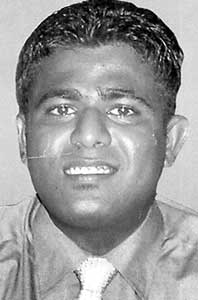The SAARC summit of a fortnight ago was a high point for the country and the city of Colombo, with much to make its citizens feel proud and happy.
But for some, the very mention of SAARC will trigger a negative response – a sad reminder of a tragedy that might not have happened, had it not been for all those special security arrangements, some involving the re-scheduling of road and rail operations, that were in place during the summit.
On one of the summit days, 24-year-old executive and Ambalangoda resident Himal de Silva was on his way to work by train when tragedy struck.
 |
| Himal de Silva |
It was Himal’s commuting habit, on reaching Colombo, to get off at the Kompannaveediya railway station and head to his office. The railway authorities had decided not to allow trains to stop at Kompannaveediya, which was a high-security zone for the duration of the summit.When the Ambalangoda train approached the Kompannaveediya station, Himal made motions to get off, but on realising the train was gathering speed, he attempted to get back into the compartment, and in doing so slipped and fell, and consequently lost a leg under the wheels of the train. He succumbed to his injuries shortly after. Himal’s funeral was held last Sunday at the Randombe general cemetery, in Ambalangoda.
According to his colleagues, Himal was always punctual to work. On that fateful day, he mentioned to colleagues travelling with him that on the previous day he had been late to work as a result of the new travelling plans in place for SAARC. All trains were stopped at the Bambalapitiya railway station, and passengers were checked by security officers before the trains were allowed to proceed.
Himal’s grieving mother, D. K. Swarnalatha, 57, told The Sunday Times that her son Himal left as usual that morning for work, taking the 6.05 am train from Ambalangoda, after having a cup of tea at home.
According to his mother, Himal was a conscientious employee who made sure he arrived at work on time.
“He was always punctual,” she said. “And he took very few holidays. That week, during the SAARC summit, many people with jobs in Colombo decided to go on leave because of all the travel inconveniences, but Himal wanted to go to work as usual.”
From his hospital bed, Himal told his only brother Geemuni Lakmal, 23, what had happened. When the train started to slow down, as it was nearing the Kompannaveediya station, he prepared to step off, and then changed his mind when the train started to pick up speed again. It was at this point that he slipped off and lost his leg.
According to eyewitnesses, Himal was doubly unfortunate that day.
Instead of dispatching the accident victim immediately to the Colombo National Hospital, the railway guard decided to take Himal to the Fort Railway station and then call for an ambulance.
“The guard should have known that it would be quicker to get an ambulance from the Darley Road fire station, using the Union Place route to get to the Slave Island station, rather than waiting for the train to get to Fort and then take the victim to hospital,” said one witness.
Railway sources explained the guard’s action by pointing out that, because of the tight security arrangements, the guard would not have wanted to stop the train at Kompannaveediya. There was a concern that passengers would start getting off the train, in an area that was strictly off limits to crowds.
Meanwhile, other eyewitnesses say the guard’s decision had resulted in a critical half hour’s delay to get Himal to hospital.
The Kompannaveediya station master, B. M. A. Gunawardena, told The Sunday Times that he was informed about the accident only after the train had left the station. He said he had heard only later that the train had stopped for five minutes and that the injured passenger had been taken to the Fort station.
Questions are still being asked as to why the injured passenger was not handed over to officers at the Kompannaveediya railway station. Colleagues of Himal who were on the train that day with him were standing by, waiting to rush him to hospital.
In the event of a railway accident, railway staff and those manning the train are expected to dispatch the injured to the closest hospital as fast as possible, said Railway General Manager, Dr. Lalithasiri Gunaruwan.
“They are expected to stop at the closest station, or between stations, and dispatch the victim or victims for immediate treatment,” Dr. Gunaruwan said, adding that he was not aware of the incident involving Himal de Silva.
Colleagues who used to travel daily with Himal said that railway staff should know what to do in such emergency situations, and how to deal efficiently and effectively with accident victims. They pointed out that half an hour could make all the difference in a life-and-death situation. | 
